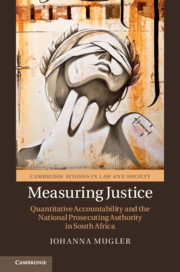 Measuring Justice
Measuring Justice Book contents
- Measuring Justice
- Cambridge Studies in Law and Society
- Measuring Justice
- Copyright page
- Dedication
- Contents
- Acknowledgements
- Abbreviations
- Legislation – Statutes
- Introduction
- I From Apartheid Administrators to Lawyers of the People: A History of Accountability inside the South African Prosecution Authority (1948–2018)
- 2 Ethnographic Research in a Multi-Local Organisation: Access, Challenges and Methods
- 3 ‘Stats Talk’ and Alternative Expressions of Accountability: NPA Lower Court Prosecutors at Work
- 4 No Fear of Numbers: Reactivity and the Political Economy of NPA Performance Measurement
- 5 At the Top of the NPA
- 6 Lies, Damned Lies and Statistics
- Concluding Remarks
- Bibliography
- Index
- Cambridge Studies in Law and Society
Introduction
Published online by Cambridge University Press: 22 June 2019
- Measuring Justice
- Cambridge Studies in Law and Society
- Measuring Justice
- Copyright page
- Dedication
- Contents
- Acknowledgements
- Abbreviations
- Legislation – Statutes
- Introduction
- I From Apartheid Administrators to Lawyers of the People: A History of Accountability inside the South African Prosecution Authority (1948–2018)
- 2 Ethnographic Research in a Multi-Local Organisation: Access, Challenges and Methods
- 3 ‘Stats Talk’ and Alternative Expressions of Accountability: NPA Lower Court Prosecutors at Work
- 4 No Fear of Numbers: Reactivity and the Political Economy of NPA Performance Measurement
- 5 At the Top of the NPA
- 6 Lies, Damned Lies and Statistics
- Concluding Remarks
- Bibliography
- Index
- Cambridge Studies in Law and Society
Summary
This is a book about accountability. More specifically, it is about quantitative accountability and the National Prosecuting Authority (NPA) in South Africa. I am interested in how prosecutors, who have the power to call others to account for wrongdoing, are themselves held accountable Central to this study is the role played by recently introduced performance measurement systems in the way prosecutors are held accountable. I explore how these measurement systems shape and influence South African prosecutors’ understanding of accountability and their prosecutorial practices.I ask whether there are significant implications for legal work, as the language of ‘performance statistics’ ‘indicators’ ‘targets’, ‘rates’ and ‘rankings’ is becoming common parlance within the judicial system.
While numerical representations are gaining increasing importance for the demonstration of accountability in many government and non-government settings in the twenty-first century, the effects and consequences of this for our social, institutional and political life are relatively opaque.
- Type
- Chapter
- Information
- Measuring JusticeQuantitative Accountability and the National Prosecuting Authority in South Africa, pp. 1 - 20Publisher: Cambridge University PressPrint publication year: 2019
